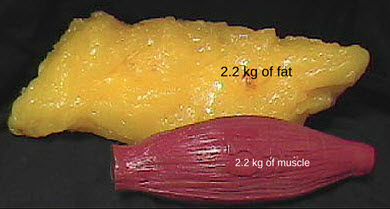
A kilo of muscle weighs the same as a kilo of fat, or a kilo of feathers for that matter. In spite of what you might hear bandied about the place, muscle does not weigh more than fat.
Because muscle is more dense than fat, a kg of muscle takes up less room than fat – think feathers compared to steel. So a cm3 of muscle will weigh more than a ckm3 of fat.
Losing Fat and Gaining Muscle
Many weight loss articles, fitness trainers, and the like will advise you not to look at the scales too much if you are wanting to lose weight. Instead you should focus on how your feel generally. Whether you have more energy, do your clothes fit better, and I agree, these are great measures of whether or not an exercise program is effective.
However, if your goal is to lose weight, then you need to know how much you weigh, otherwise you’ll never know if you’ve reached your goal.
Part or the reasoning behind the “no scale policy” is that “muscle weighs more than fat” or more correctly, muscle takes up less room than fat. The theory goes, as you lose fat through exercise and portion control, and gain muscle through strength training, you could actually put on weight, because, well-muscle weighs more than fat, right?
Here’s the thing. You have to be doing an awful lot of heavy weight training to put on much muscle bulk, particularly if you are female. If you are new to weight training, and you really work out hard in the weights room (I’m talking lifting low repetition, heavy weight – anywhere between 1 and 6 reps being the maximum you could knock out for a given weight) and you keep that up, consistently, a minimum of 3 times per week for a year, with the appropriate variations and progressions in your lifting program, you might, just might, put on 12kgs of muscle.
That’s the equivalent of about 1 kg of muscle gain per month. A healthy weight loss schedule is considered to be half a kg per week, roughly 2 kg per month. So, whilst it might be comforting to think that the reason you’re not losing weight is because you’re laying down so much muscle, the truth is probably that you’re not losing as much body fat as you think.
Even if you are lifting like Atlas, and laying down a kilo of dense muscle per month, if your weight stays the same, it means either you’re not losing more than 1kg of body fat per month, or you are retaining a lot of fluid.
If you don’t have a lot of body fat to lose, say under 10kg, you might be perfectly happy with losing a kg of body fat per month, and putting on a kg of muscle per month – keeping your weight at the same level. As muscle is denser than fat, that is, it doesn’t take up as much room as fat, you will most likely look and feel slimmer, and your clothes will fit better. Happy days.
But, if you know you’ve been overdoing it on the eating front for quite a while, and you’re 10kg + heavier than you were back in the day, be sure you understand that you will actually need to see the numbers on the scale go down, to lose that body fat. All that body fat is not going to “turn into muscle”.
Did you know…
A great way to lose body fat is to run? Well, that is if you want to run for about an hour a day, every day of the week. That’ll see you lose your half a kg per week. I never recommend exercise alone for weight loss. It really is at least 80% about what you eat. Exercising is awesome however, for improving your mental well being, which is so important in getting your head around reigning in poor eating habits.
In Summary
To lose body fat, you’ll need to do more aerobic exercise (the sort that makes you puff a bit) some intense training – the sort that makes you huff and puff a lot, some resistance training – using your own body weight or resistance bands, free weights or machines (my least favourite option). And you’ll need to take in fewer calories. So, nothing different to what you already know really.


